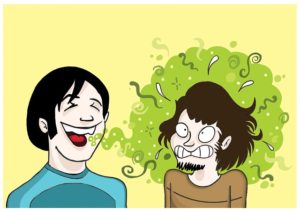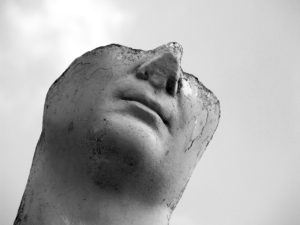Bad Breath – Episode 114
Bad Breath Basics
Halitosis, aka bad breath, can have many causes. Some bad breath you can prevent with the choices you make, but some bad breath can be a sign of a more serious issue or disease.
Oral Health
You should brush your teeth for at least 2 minutes twice a day, including the surface of your tongue, then rinse your mouth with an antibacterial mouthwash. Follow one of your brushing sessions with a good flossing. This allows you to get any food debris and bacteria build-up out of the way on a daily basis.
You should see your dentist twice a year for a deep cleaning and a check-up on your overall oral health. Your dentist will be able to help you with bad breath issues that may stem from more complicated issues like cavities, gum disease, poorly-fitting dentures, or thrush.
Dry mouth, whether due to your natural biology, medication side effects, or mouth-breathing, can lead to bad breath due to the imbalance of bacteria growth.
Your Choices
Smoking and other tobacco products can make your breath smell bad even when you are not actively using it.
The foods you eat also affect the status of your breath. The compounds that cause eaten and digested foods to smell contain sulfur-based compounds. These include broccoli, cabbage, brussel sprouts, onions and garlic, coffee, and fish. The funny thing about these smelly compounds is that they can actually make your WHOLE BODY smell (including your breath as well as other exiting air) until they have passed all the way out of your body!
Diseases
Infections, such as bronchitis, pneumonia, and sinusitis, can lead to distinctive bad breath. Postnasal drip can lead to bad breath as well. Pharyngeal diverticula that trap old food bits can make your breath smell, as well as tonsil stones that are calcified debris trapped by the tonsils. Bad breath can also be indicative of acid reflux or GERD.
Certain diseases that have telltale breath smells include diabetes, liver disease, and kidney disease.
People with diabetes are at risk of a medical emergency known as Diabetic Ketoacidosis, in which a lack of insulin renders the body’s cells unable to use the available sugar. The body starts burning fatty acids for energy and the waste product is ketones. Ketones cause the body to become very acidic. This leads to a rapid transfer of water (extracellular fluid rushes into the blood to try and neutralize and dilute the ketones and then the kidneys rapidly try to flush out the acidic fluid through the urine) which can lead to fatal dehydration. Clinicians are taught that people experiencing ketoacidosis may have fruity-smelling breath or breath that smells like acetone or nail polish remover.
People with liver disease may have breath that smells musty or like a mildewing basement. And people with kidney disease may have breath that smells fishy or like urine or ammonia. Ammonia is a typical by-product that is released in urine. Someone with kidney disease may not be able to filter out the ammonia compounds effectively. Therefore, the ammonia compounds will circulate in the blood.
Call Back
Brush your tongue – Tastebuds
Tonsil stones – Tonsils
Pharyngeal diverticula – Dysphagia
Connect with me
Support us on Patreon
Join the Pharmacist Answers Podcast Community on Facebook
Subscribe: iTunes, Stitcher, GooglePlay, TuneIn Radio
Music Credits: Up In My Jam (All Of A Sudden) by – Kubbi https://soundcloud.com/kubbiCreative Commons — Attribution-ShareAlike 3.0 Unported— CC BY-SA 3.0 http://creativecommons.org/licenses/b…Music provided by Audio Library https://youtu.be/tDexBj46oNI



